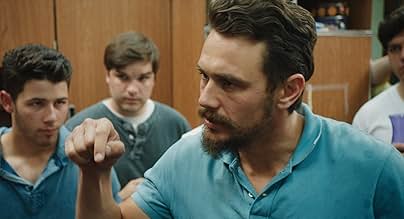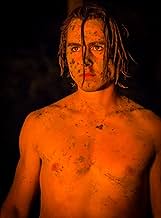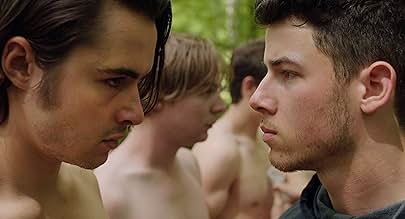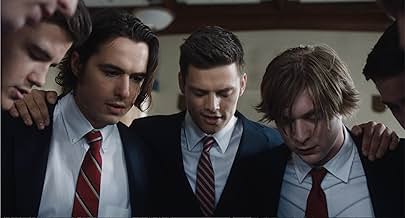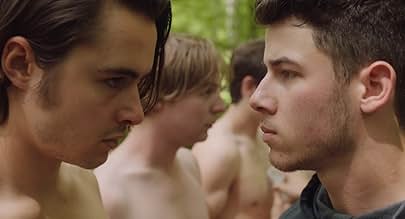PUNTUACIÓN EN IMDb
5,7/10
8,2 mil
TU PUNTUACIÓN
Un joven de diecinueve años se matriculó en la universidad junto con su hermano y ambos se unieron a la misma hermandad. Lo que sucede allí en nombre de esa unión pone a ambos hermanos a pru... Leer todoUn joven de diecinueve años se matriculó en la universidad junto con su hermano y ambos se unieron a la misma hermandad. Lo que sucede allí en nombre de esa unión pone a ambos hermanos a prueba de manera brutal.Un joven de diecinueve años se matriculó en la universidad junto con su hermano y ambos se unieron a la misma hermandad. Lo que sucede allí en nombre de esa unión pone a ambos hermanos a prueba de manera brutal.
- Dirección
- Guión
- Reparto principal
- Premios
- 5 nominaciones en total
Reseñas destacadas
There is one review that describes GOAT as "Full Metal Jacket meets Animal House," which might be true if this movie were at all a comedy, or even a movie that examines the long-term effects of psychological abuse. There is a lot that Andrew Neel tries to say from the director's chair, but aside from a few interesting moments here and there, it seems like he may have bitten off more than he can chew.
The story follows Brad (Ben Schnetzer), the older brother of an all-around popular college boy (Brett, played by Nick Jonas). The film opens with Brad offering a ride to a set of strangers in the dead of night. He offers only because he believes they are coming from the same party. Right away the suspicions are tingling. A 20-minute ride down a deserted road finally has Brad come to terms with his situation: that he is mugged, beaten, and left for death in the middle of a field on the outskirts of town. His face is scarred, bruised, and his ease with strangers is never the same.
The movie is something I was not expecting, an odyssey into the mind of fear along the lines of a film Harmony Korine might admire. Where I was prepared for an dark yet entertaining film like Whiplash, we delve into the bowels of a film that more closely resembles "Spring Breakers," another hypnotic story with similar themes of the recklessness of millennials.
As the story falls into place, Brad finally decides to start college (we assume he took a year off after high school, since his younger brother is already well into his degree). Even before classes begin, Brad attends a Fall party at Brett's fraternity. The house is run- down, jammed, full of empty plastic cups and vomit in every corner. It's not so much a symbol as a right of passage: to belong to this house is to have a brotherhood that always has your back. James Franco (a producer on the film) has a brief but memorable scene as a former classmate who seems to hang around at the house a couple hours too long. Stuck in the past, he nonetheless shows Brad that this is an institution to which you can belong and be protected.
And so begins the odyssey. "Hell Week," as it's notoriously dubbed, is the hazing process where Brad, his roommate, and others, attempt to win the trust of the fraternity and eventually get "pinned" before the school year is out. The name is aptly given. Pledges are brought down to the basement where they are stripped, tied up, urinated on, and made to drink to the point of nausea. They drink cups of hot sauce. They are slapped. This is only day one.
The comparison to "Full Metal Jacket" would seem appropriate on a surface level, but the film rarely dives into the psyche of Brad, a boy who is torn between fear and commitment to pleasing his brother. Just as he allowed strangers to abuse him in the film's opening, so does he (poetically) allow it to happen again, this time for acceptance. In fact, maybe the abuse comes to represent a window into the connected world. Life is full of people who come and go, but what's the true test of a friendship if you literally go to hell and back.
The abuse, of course, is the highlight of the film, and the vivid scenes of torture are at times a bit overwhelming. We know going in that this is a movie based on actual events (events in which the death of a student was the culmination of the abuse), and as such each new scene comes with a heightened sense of dread: will this turn deadly? The violence is so relentless that I doubted I would even end this film with a positive thing to say about it. Filmmaking and production is one thing, but if you are making a movie about violence solely for the sake of violence, then what is the point?
I found Schnetzer's performance something that was both fragile and determined. While I at times failed to see motivation in certain scenes, his portrayal of Brad is fully-realized and the basic moral compass of the movie. From beginning to end, the story can be simplified to that of a boy who learns to no longer be afraid. It's a small arc, muddled in with a plot of hazing that does very little for the cause of the overall picture. On an intimate level, this was a story I could get behind. Everyone likes a happy ending, don't they?
The story follows Brad (Ben Schnetzer), the older brother of an all-around popular college boy (Brett, played by Nick Jonas). The film opens with Brad offering a ride to a set of strangers in the dead of night. He offers only because he believes they are coming from the same party. Right away the suspicions are tingling. A 20-minute ride down a deserted road finally has Brad come to terms with his situation: that he is mugged, beaten, and left for death in the middle of a field on the outskirts of town. His face is scarred, bruised, and his ease with strangers is never the same.
The movie is something I was not expecting, an odyssey into the mind of fear along the lines of a film Harmony Korine might admire. Where I was prepared for an dark yet entertaining film like Whiplash, we delve into the bowels of a film that more closely resembles "Spring Breakers," another hypnotic story with similar themes of the recklessness of millennials.
As the story falls into place, Brad finally decides to start college (we assume he took a year off after high school, since his younger brother is already well into his degree). Even before classes begin, Brad attends a Fall party at Brett's fraternity. The house is run- down, jammed, full of empty plastic cups and vomit in every corner. It's not so much a symbol as a right of passage: to belong to this house is to have a brotherhood that always has your back. James Franco (a producer on the film) has a brief but memorable scene as a former classmate who seems to hang around at the house a couple hours too long. Stuck in the past, he nonetheless shows Brad that this is an institution to which you can belong and be protected.
And so begins the odyssey. "Hell Week," as it's notoriously dubbed, is the hazing process where Brad, his roommate, and others, attempt to win the trust of the fraternity and eventually get "pinned" before the school year is out. The name is aptly given. Pledges are brought down to the basement where they are stripped, tied up, urinated on, and made to drink to the point of nausea. They drink cups of hot sauce. They are slapped. This is only day one.
The comparison to "Full Metal Jacket" would seem appropriate on a surface level, but the film rarely dives into the psyche of Brad, a boy who is torn between fear and commitment to pleasing his brother. Just as he allowed strangers to abuse him in the film's opening, so does he (poetically) allow it to happen again, this time for acceptance. In fact, maybe the abuse comes to represent a window into the connected world. Life is full of people who come and go, but what's the true test of a friendship if you literally go to hell and back.
The abuse, of course, is the highlight of the film, and the vivid scenes of torture are at times a bit overwhelming. We know going in that this is a movie based on actual events (events in which the death of a student was the culmination of the abuse), and as such each new scene comes with a heightened sense of dread: will this turn deadly? The violence is so relentless that I doubted I would even end this film with a positive thing to say about it. Filmmaking and production is one thing, but if you are making a movie about violence solely for the sake of violence, then what is the point?
I found Schnetzer's performance something that was both fragile and determined. While I at times failed to see motivation in certain scenes, his portrayal of Brad is fully-realized and the basic moral compass of the movie. From beginning to end, the story can be simplified to that of a boy who learns to no longer be afraid. It's a small arc, muddled in with a plot of hazing that does very little for the cause of the overall picture. On an intimate level, this was a story I could get behind. Everyone likes a happy ending, don't they?
The title and promotional photo of this film serve as early warnings that this is going to be an unpleasant story, especially because it's not labeled a comedy as many frat movies tend to be.
This is the story of Brad, a sweet guy from the midwest, who joins his real-life brother's fraternity. Having gone through the college fraternity experience myself, I can attest to this film's realistic portrayal of hell week and brotherhood. But the story, as good as the acting is, lacks insight into why the brothers continue putting pledges through horrific initiations year after year. We get no view into what the active brothers are plotting each day and why. Neither are we privy to their conversations outside the hazing. There's brief conflict between Jonas and his peers, but it's so short, and it would have been natural to dig into more intra-brother conflict as to the absurdity of hell week.
The entire middle act of the film focuses on one hazing incident after another. The result is a film that largely treads water until it hits the crisis (one of the pledges doesn't make it), the climax (an investigation) and ultimate resolution, which is weak at best. We also get no interaction between the fraternity and the rest of the campus or community, which gives the film an odd isolation. But I get it ... the director/writer/producers wanted to keep the story strictly focused on the fraternity.
That said, superb performances by Jake Picking, who plays Dixon, the frat president, Nick Jonas and Ben Schnetzer (a rising young actor who shows real promise). I've always like Jonas subtle, nuanced performances, where he displays a natural affinity for the screen. He never looks like he's acting.
Schnetzer does an excellent job playing little brother, but trying hard to be his equal.
This is the story of Brad, a sweet guy from the midwest, who joins his real-life brother's fraternity. Having gone through the college fraternity experience myself, I can attest to this film's realistic portrayal of hell week and brotherhood. But the story, as good as the acting is, lacks insight into why the brothers continue putting pledges through horrific initiations year after year. We get no view into what the active brothers are plotting each day and why. Neither are we privy to their conversations outside the hazing. There's brief conflict between Jonas and his peers, but it's so short, and it would have been natural to dig into more intra-brother conflict as to the absurdity of hell week.
The entire middle act of the film focuses on one hazing incident after another. The result is a film that largely treads water until it hits the crisis (one of the pledges doesn't make it), the climax (an investigation) and ultimate resolution, which is weak at best. We also get no interaction between the fraternity and the rest of the campus or community, which gives the film an odd isolation. But I get it ... the director/writer/producers wanted to keep the story strictly focused on the fraternity.
That said, superb performances by Jake Picking, who plays Dixon, the frat president, Nick Jonas and Ben Schnetzer (a rising young actor who shows real promise). I've always like Jonas subtle, nuanced performances, where he displays a natural affinity for the screen. He never looks like he's acting.
Schnetzer does an excellent job playing little brother, but trying hard to be his equal.
I saw this film in the early hours of the morning on British television, without any recommendation to watch it. It was one of the most necessary, and at the same time one of the most brutal films I have ever seen. I do not want to give away spoilers, but the opening credits of half naked men shouting warned me that this was not going to be entertainment, and the opening scenes of a young man being beaten almost to death made me want to turn the film off. I watched it and followed this young man's path to recovery, and along with his brother entering an elite school for further education. Here the real horror began. He had to prove his worth by being 'hazed' which is as I understood it a ritual of various tortures to become 'worthy' of being there. The tortures and the verbal abuse I will not describe, except to say that it was like watching pages of description out of De Sade. The most used of the verbal abuses was anti-gay, along with others used against women. This was the heart, if that is the appropriate word, of the film, along with physical humiliation and torture. Not since Pasolini's 'Salo' have I seen a film like this; another condemnation of human nature that was equally necessary to see and try to understand. The film, as film, is in my opinion equal to Pasolini both for its cinematic merits, and also for daring to go into the lowest depths of humanity. I expected a very violent climax, but instead I saw the young man trying to come to terms with what he has been through. I must just add that there was no disjunction between the opening violence, and the violence in the school. As far as I could see they completed the circle of extreme torture filtering down from the top of society to the most dispossessed in our society. Necessary films are actually quite few, but this in my opinion is one of them. A fully justified 10 for its content, and what it tells us about aspects of human behaviour we would rather turn away from.
Goat starts off similar to such frat boy slapstick comedies as Animal House or the more recent Everybody Wants Some, but nowhere near as funny and entertaining, unless you count a ridiculous overblown cameo from James Franco as man in his mid-thirties who saw the best years of his life as being in the frat, which is why he shows up to say high once in a while. Off the bat the movie did show a tone that said it was going to be something different from the fun and games of Frat life.
And the tone definitely sets up for the dark mood change. The second most famous person in this film, Nick Jonas, has a supporting role as a frat boy who was already semi-questioning the whole thing when his brother pledges during hell week, and it's not sitting well having to watch him going through the sick disturbing things they make them do.
Goat, works to expose the harshness and the dangers of Hazing. It does a great job of giving a pretty no holds barred look at one of college's oldest traditions.
But other than this view of how dark and disturbing the male bonding process can get, the movie has very little in a narrative story.
Goat, acts like a document on something based on true events. You'll get nothing from it, no lesson learned, only the ugly truth on frat hazing.
And the tone definitely sets up for the dark mood change. The second most famous person in this film, Nick Jonas, has a supporting role as a frat boy who was already semi-questioning the whole thing when his brother pledges during hell week, and it's not sitting well having to watch him going through the sick disturbing things they make them do.
Goat, works to expose the harshness and the dangers of Hazing. It does a great job of giving a pretty no holds barred look at one of college's oldest traditions.
But other than this view of how dark and disturbing the male bonding process can get, the movie has very little in a narrative story.
Goat, acts like a document on something based on true events. You'll get nothing from it, no lesson learned, only the ugly truth on frat hazing.
This film tells the story of a young man who gets brutally attacked by two strangers. He then goes to college, joins a fraternity house, and gets transformed into a different person.
There has been a lot of films that portrays fraternity houses to be super fun, but finally there is a film that shows that fraternity houses may not be as rosy as it appear. The story focuses on the initiation week, where new recruits are humiliated and even tortured. It is scary to see what happens in the film, even though the tone of the film is not too dark. The level of subhuman behaviour is terrifying, because the abuse is legitimised by "tradition".
"Goat" tells a compelling story of abuse, abused and abuser. It lets people reflect on what is right and what is wrong. Let's hope this film will find more audience.
There has been a lot of films that portrays fraternity houses to be super fun, but finally there is a film that shows that fraternity houses may not be as rosy as it appear. The story focuses on the initiation week, where new recruits are humiliated and even tortured. It is scary to see what happens in the film, even though the tone of the film is not too dark. The level of subhuman behaviour is terrifying, because the abuse is legitimised by "tradition".
"Goat" tells a compelling story of abuse, abused and abuser. It lets people reflect on what is right and what is wrong. Let's hope this film will find more audience.
¿Sabías que...?
- CuriosidadesBased on the true story and memoir by Brad Land.
- Banda sonoraJack Move
Performed by Craig Craig
Courtesy of Format
Selecciones populares
Inicia sesión para calificar y añadir a tu lista para recibir recomendaciones personalizadas
- How long is Goat?Con tecnología de Alexa
Detalles
Taquilla
- Recaudación en Estados Unidos y Canadá
- 23.020 US$
- Fin de semana de estreno en EE. UU. y Canadá
- 23.020 US$
- 25 sept 2016
- Recaudación en todo el mundo
- 23.020 US$
- Duración
- 1h 36min(96 min)
- Color
- Relación de aspecto
- 1.85 : 1
Contribuir a esta página
Sugerir un cambio o añadir el contenido que falta



